- Home
- Robin Hobb
Dragon Keeper Page 2
Dragon Keeper Read online
Page 2
Some were simply too battered, too weary, too thin for such a journey. One big orange serpent died draped across the log wall of the penned water, unable to drag himself any farther. Sisarqua was close to him when his great wedge-shaped head dropped suddenly beneath the water. Impatiently, she waited for him to move on. Then his spiky mane of tendrils suddenly spasmed and released a final rush of toxins. They were faint and feeble, the last reflexive defenses of his body, yet they clearly signaled to any serpents within range that he was dead. The smell and taste of them in the water summoned her to the feast.
Sisarqua had not hesitated. She had been the first to tear into his body, filling her mouth with his flesh, gulping it down and tearing another chunk free before the rest of the tangle even realized the opportunity. The sudden nourishment dizzied her almost as much as the rush of his memories. This was the way of her kind, not to waste the bodies of the dead but to take from them both nourishment and knowledge. Just as every dragon carried within him the memories of his entire line, so every serpent retained the memories of those who had gone before. Or was supposed to. Sisarqua and every other serpent wallowing dismally alongside her had remained in serpent form too long. Memories had faded and with them, intelligence. Even some of those who now strove to complete the migration and become dragons were reduced to brutish shadows of what they should have been. What sort of dragons would they become?
Her head had darted in, mane abristle, to seize another sizable chunk of the orange serpent’s flesh. Her brain whirled with memories of rich fishing and of nights spent singing with his tangle under the jewel-bright skies. That memory was very old. She suspected it had been scores of years since any tangle had risen from the Plenty to the Lack to lift their voices in praise of the starspeckled sky above them.
Others had crowded her then, hissing and lifting their manes in threat to one another as they strove to share the feast. She tore a final piece of flesh free and then wallowed over the log that had stopped the orange. She had tossed the hunk of warm meat down whole and felt it distend her gullet pleasantly. The sky, she thought, and in response felt a brief stir of the orange serpent’s dim dragon memories. The sky, open and wide as the sea. Soon she would sail it again. Not much farther, Tintaglia had promised.
But distance is measured one way by a dragon a-wing and quite another way by a battered serpent wallowing up a shallow river. They did not see the clay banks that afternoon. Night fell upon them, sudden as a blow, the short day spent almost before it had begun. For yet another night, Sisarqua endured the cold of the air that the shallow river did not allow her to escape. The water that flowed past was barely sufficient to keep her gills wet; the skin on her back felt as if it would crack from the dry cold that scoured her. And in the late morning, the sun that found its way down onto the wide river between the jungled banks revealed more serpents who would never complete the migration. Again, she was fortunate enough to feed from one of the corpses before the rest of the horde drove her away from it. Again, Tintaglia circled overhead, calling down the promise that it was not far to Cassarick and rest, the long peaceful rest of the transformation.
The day had been chill, and the skin of her back was dried by a long night spent above water. She could feel the skin cracking beneath her scales, and when the river deepened enough to allow her to submerge and soak her gills, the milky river water stung her split skin. She felt the acidic water eat at her. If she did not reach the cocooning beach soon, she would not make it.
The afternoon was both horribly short and painfully long. In the deeper stretches where she could swim, the water stung her breached skin. But that was preferable to the places where she crawled on her belly like a snake, fighting for purchase on the slimy rocks at the bottom of the riverbed. All around her, other immense sea serpents squirmed and coiled and flexed, trying to make their way upriver.
When she arrived, she did not know it. The sun was already westering behind the tall banks of trees that fronted the river. Creatures that were not Elderlings had kindled torches and stuck them in a great circle on a muddy riverbank. She peered at them. Humans. Ordinary two-legs, little more than prey. They scampered about, apparently in ser vice to Tintaglia, serving her as once Elderlings would have done. It was oddly humiliating; was this how low dragons had fallen, to be reduced to consorting with humans?
Sisarqua lifted her maned head high, tasting the night air. It was not right. It was not right at all. She could find no certainty in her hearts that this was the cocooning place. Yet on the shore she could see some of the serpents who had preceded her. A few were already encapsulated in cases spun from the silver-streaked clay and their own saliva. Others still struggled, wearily, to complete the task.
Complete the task. Yes. Her mind jolted back to the present. There was no more time for these memories. With a final heave, she brought up the last of the clay and bile that remained to her and completed the thick lip of her case’s neck. But she was empty now; she had misjudged. She had nothing left to seal her case. If she tried to reach the slurry, she would break the coiled cocoon she had made, and she knew with painful certainty that she would not have the strength to weave it again. So close she had come, so close, and yet here she would die, never to rise.
A wave of panic and fury washed through her. In one instant of conflict, she decided to wrest herself free of the cocoon, and to remain absolutely still. The stillness won, bolstered by a flood of memories. That was the virtue of having the memories of one’s ancestors; sometimes the wisdom of old prevailed over the terrors of the present. In the stillness, her mind cleared. She had memories to draw on, memories of serpents who had survived such an error, and dying memories of ones who had not. The corpses of the failed serpents had been devoured by those who survived. Thus even the memories of fatal errors lived on to serve the needs of survivors.
She clearly saw three paths. Stay within her case and call for a dragon to help her finish sealing her case. Well, that was of no use to her. Tintaglia was already overwhelmed. Break free of her case and demand that the dragon bring her food, so that she might eat and regain her strength to spin a new case. Another impossible solution. Panic threatened again. This time it was an act of her own will that pushed it aside. She was not going to die here. She had come too far and struggled through too many dangers to let death claim her now. No. She was going to live, she was going to emerge in spring as a dragon and take back her mastery of the skies. She would fly again. Somehow.
How?
She would live to rise as a queen. Demand that which was owed to a queen dragon now. The right of first survival in hard times. She drew what breath she could and trumpeted out a name. “Tintaglia!”
Her gills were too dry, her throat nearly destroyed from the spinning of the coarse clay into thread. Her cry for aid, her demand, was barely a whisper. And even her strength to break free of her case was gone, fading beyond recall. She was going to die.
“Are you in trouble, beautiful one? I feel your distress. Can I help you?”
Inside the restrictive casing she could not turn her head. But she could roll her eyes and see the one who addressed her. An Elderling. He was very small and very young, but in the touch of his mind against hers, there was no mistaking him. This was no mere human, even if his shape still resembled one.
Her gills were so dry. Serpents could rise above the water for a time, could even sing, but this long exposure to the cold, dry air was pushing her to the edges of her ability to survive in the Lack. She drew in a labored breath. Yes. The scent was there, and she knew without any doubt that Tintaglia had imprinted him. He brimmed with her glamour. Slowly she lidded her eyes and unlidded them again. She still could not see him clearly. She was drying out too quickly. “I can’t,” she said. They were the only words she could manage.
She felt him swell with distress. An instant later, his small voice raised the alarm. “Tintaglia! This one is in trouble! She cannot finish her case. What should we do?”
The dragon’s
voice boomed back to him from across the cocooning grounds. “The clay slurry, very wet! Pour it in. Do not hesitate. Cover her head with it and smooth it over the open end of her casing. Seal her in, but be sure that the first layer is very wet.” Even as she spoke, the dragon herself hastened to Sisarqua’s side. “A female! Be strong, little sister. There are few who will hatch to be queens. You must be among them.”
The workers had come running, some trundling barrows, others bearing slopping buckets of silvery-gray clay. She had drawn her head in as far as it would go and lidded her eyes. The young Elderling outside her case shouted his orders, bidding them, “Now! Don’t wait for Tintaglia! Now, her skin and eyes are drying too fast. Pour it in. That’s it! And more! Another bucket! Fill that barrow again. Hurry, man!”
The stuff sloshed over her, drenching and sealing her. Her own toxins, present in the sections of the case she had woven, were affecting her now. She felt herself sinking into something that was not sleep. It was rest, however. Blessed, blessed rest.
She sensed Tintaglia standing close by her. She felt the sudden weight of warm, regurgitated slurry and knew with gratitude that the dragon had sealed her case for her. For a moment, toxins rich with memories stung her skin. Not just dragon memories from Tintaglia, but a share of serpent lore from the one Tintaglia had recently devoured enriched her case. Dimly she heard Tintaglia directing the scurrying workers. “Her case is thin here. And over here. Bring clay and smooth it on in layers. Then bank her case with leaves and sticks. Cover it well from the light and the cold. They cocoon late. They must not feel the sun until summer is full upon them, for I fear they will not have fully developed when spring comes. And when you are finished here, come to the east end of the grounds. There is another one struggling there.”
The Elderling’s voice reached into Sisarqua’s fading consciousness. “Did we seal it in time? Will she survive to hatch?”
“I do not know,” Tintaglia replied gravely. “The year is late, the serpents old and tired, and half of them are next to starved. Some from the first wave have already died in their cases. Others still straggle in the river or struggle to pass the ladder. Many of them will die before they even reach the shore. That is for the best; their bodies will nourish the others and increase their chances of survival. But there is small good to be had from those who die in their cocoons, only waste and disappointment.”
Darkness was wrapping Sisarqua. She could not decide if she was chilled to her bones or cozily warm. She sank deeper, yet still felt the uneasy silence of the young Elderling. When he finally spoke, his words came to her more from his thoughts than from his lips. “The Rain Wild people would like to have the cases of the ones who die. They call such material ‘wizardwood’ and have many valuable uses for—”
“NO!” The emphatic denial by the dragon shocked Sisarqua back to a moment of awareness. But her depleted body could not long sustain it, and she almost immediately began to sink again. Tintaglia’s words followed her down into a place below dreams. “No, little brother! All that is of dragons belongs only to dragons. When spring comes, some of these cases will hatch. The dragons who emerge will devour the cases and bodies of those who do not hatch. Such is our way, and in such a way is our lore preserved. Those who die will give strength to those who live on.”
Sisarqua had but a moment to wonder which she would be. Then blackness claimed her.
Day the 17th of the Hope Moon
Year the 7th of the Reign of the Most Noble and Magnificent Satrap Cosgo
Year the 1st of the Independent Alliance of Traders
From Detozi, Keeper of the Birds, Trehaug
To Erek, Keeper of the Birds, Bingtown
Attached you will find a formal appeal from the Rain Wild Council for a just and fair payment of the additional and unexpected expenses incurred by us in the care of the serpent cases for the dragon Tintaglia. A swift reply is requested by the Council.
Erek,
A spring flash flood has hit us hard. Tremendous damage to some of the dragon cases, and some are missing entirely. Small barge overturned on the river, and I fear it was the one carrying the young pigeons I was sending you to replenish the Bingtown flock. All were lost. I will allow my birds to set more eggs, and send you the offspring as soon as they are fledged. Trehaug does not seem like Trehaug anymore, there are so many Tattooed faces! My master has said that I must not date things according to our Independence, but I defy him. Rumor will become a reality, I am sure!
Detozi
Chapter One
The Riverman
It was supposed to be spring. Damn cold for spring. Damn cold to be sleeping out on the deck instead of inside the deckhouse. Last night, with the rum in him and a belt of distant stars twinkling through an opening in the rain forest canopy, it had seemed like a fine idea. The night hadn’t seemed so chilly, and the insects had been chirring in the treetops and the night birds calling to one another while the bats squeaked and darted out in the open air over the river. It had seemed a fine night to lie back on the deck of his barge and look up at the wide world all around him and savor the river and the Rain Wilds and his proper place in the world. Tarman had rocked him gently and all had been right.
In the iron-gray dawn, with dew settled on his skin and clothes and every joint in his body stiff, it seemed a damn-fool prank more suited to a boy of twelve than a riverman of close to thirty years. He sat up slowly and blew out a long breath that steamed in the chill dawn air. He followed it with a heartfelt belch of last night’s rum. Then, grumbling under his breath, he lurched to his feet and looked around. Morning. Yes. He walked to the railing and made water over the side as he considered the day. Far above his head, in the treetops of the forest canopy, day birds were awake and calling to one another. But under the trees at the edge of the river, dawn and daylight were tenuous things. Light seeped down, filtered by thousands of new leaves and divested of its warmth before it reached him. As the sun traveled higher, it would shine down on the open river and send fingers under the trees and through the canopy. But not yet. Not for hours.
Leftrin stretched, rolling his shoulders. His shirt clung to his skin unpleasantly. Well, he deserved to be uncomfortable. If any of his crew had been so stupid as to fall asleep out on the deck, that’s what he would have told them. But they hadn’t been. All eleven of his men slumbered on in the narrow, tiered bunks that lined the aft wall of the deckhouse. His own more spacious bunk had gone empty. Stupid.
It was too early to be awake. The fire in the galley stove was still banked; no hot water simmered for tea, no flatcakes bubbled on the grill. And yet here he was, wide awake, and of a mind to take a walk back under the trees. It was a strange impulse, one he had no conscious rationale for, and yet he recognized it for the kind of itch it was. It came, he knew, from the unremembered dreams of the night before. He reached for them, but the tattered shreds became threads of cobweb in his mind’s grasp, and then were gone. Still, he’d follow their lingering inspiration. He’d never lost out by paying attention to those impulses, and almost inevitably regretted it the few times he’d ignored them.
He went into the deckhouse, past his sleeping crew and through the little galley and forward to his cabin. He exchanged his deck shoes for his shore boots. The knee boots of greased bullhide were nearly worn through; the acidic waters of the Rain Wild River were not kind to footwear, clothing, wood, or skin. But his boots would survive another trip or two ashore, and as a result, his skin would, too. He caught up his jacket from its hook and slung it about his shoulders and walked aft past the crew. He kicked the foot of the tillerman’s bunk. Swarge’s head jolted up and the man stared at him blearily.
“I’m going ashore, going to stretch my legs. Probably be back by breakfast.”
“Aye,” Swarge said, the only acceptable reply and close to the full extent of Swarge’s conversational skills. Leftrin grunted an affirmation and left the deckhouse.
The evening before, they had nosed the barge up onto a marsh
y bank and tied it off to a big leaning tree there. Leftrin swung down from the blunt-nosed bow of the barge onto mud-coated reeds. The barge’s painted eyes stared off into the dimness under the trees. Ten days ago, a warm wind and massive rainstorms had swelled the Rain Wild River, sending the waters rushing up above their normal banks and over the low shores. In the last two days, the waters had receded, but the plant life along the river was still recovering from being underwater for several days of silt-laden flooding. The reeds were coated with filth, and most of the grasses were flattened beneath their burdens of mud. Isolated pockets of water dotted the low bank. As Leftrin strode along, his feet sank and water seeped up to fill in his tracks.
He wasn’t sure where he was going or why. He let his whim guide him as he ventured away from the riverbank into the deeper shade beneath the vine-draped trees. There, the signs of the recent flooding were even more apparent. Driftwood snags were wedged among the tree trunks. Tangles of muddy foliage and torn webs of vines were festooned about the trees and bushes. Fresh deposits of river silt covered the deep moss and low-growing plants. The gigantic trunks of the enormous trees that held up the roof of the Rain Wilds were impervious to most floods, but the undergrowth that rioted in their shade was not. In some places, the current had carved a path through the underbrush; in others, the slime and sludge of the flood burdened the foliage so heavily that the brush bent in muddied hummocks.
Where he could, Leftrin slogged in the paths that the river current had gouged through the brush. When the mud became too soft, he pushed through the grimy undergrowth. He was soon wet and filthy. A branch he pushed aside sprang back, slapping him across the brow and spattering his face with mud. He hastily wiped the stinging stuff from his skin. Like many a riverman, his arms and face had been toughened by exposure to the acidic waters of the Rain Wild River. It gave his face a leathery, weathered look, a startling contrast to his gray eyes. He privately believed that this was why he had so few of the growths and less of the scaliness that afflicted most of his Rain Wild brethren. Not that he considered himself a thing of beauty or even a handsome man. The wandering thought made him grin ruefully. He pushed it from his mind and a dangling branch away from his face and forced his way deeper.

 Ship of Destiny
Ship of Destiny Golden Fool
Golden Fool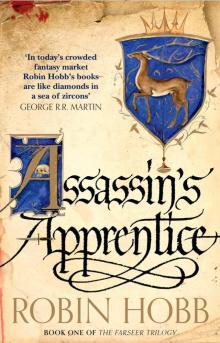 Assassins Apprentice
Assassins Apprentice The Dragon Keeper
The Dragon Keeper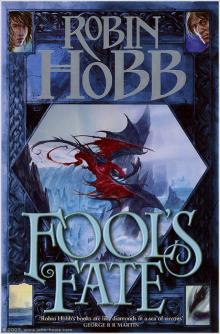 Fools Fate
Fools Fate Fools Errand
Fools Errand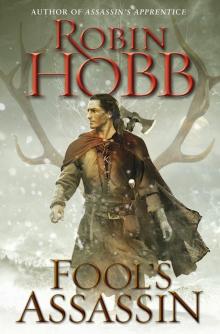 Fools Assassin
Fools Assassin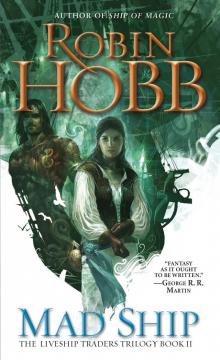 The Mad Ship
The Mad Ship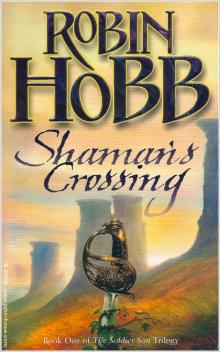 Shamans Crossing
Shamans Crossing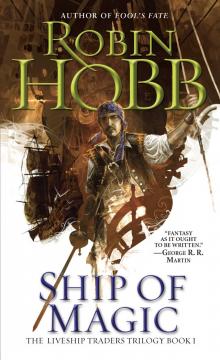 Ship of Magic
Ship of Magic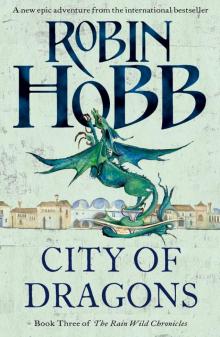 City of Dragons
City of Dragons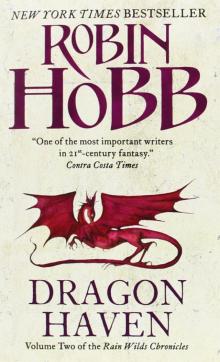 Dragon Haven
Dragon Haven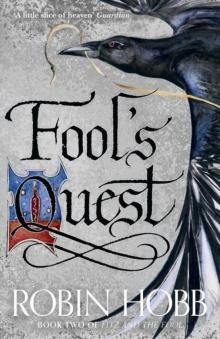 Fools Quest
Fools Quest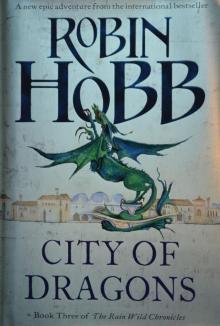 Blood of Dragons
Blood of Dragons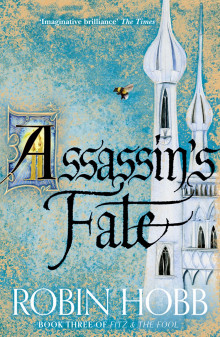 Assassin's Fate
Assassin's Fate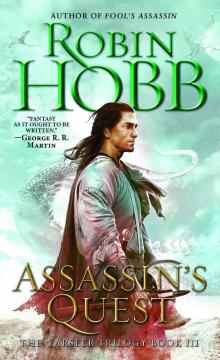 Assassins Quest
Assassins Quest Renegades Magic
Renegades Magic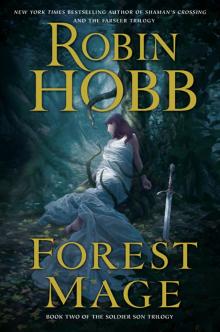 Forest Mage
Forest Mage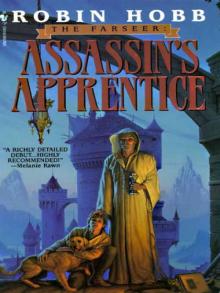 Assassin's Apprentice tft-1
Assassin's Apprentice tft-1 Assassin's Quest tft-3
Assassin's Quest tft-3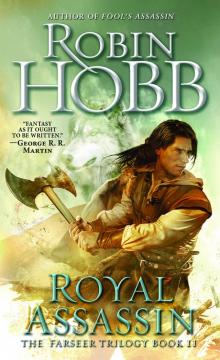 Royal Assassin
Royal Assassin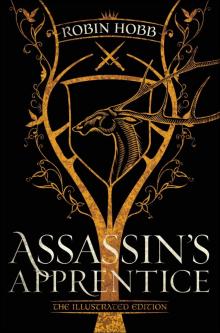 Assassin's Apprentice (The Illustrated Edition)
Assassin's Apprentice (The Illustrated Edition)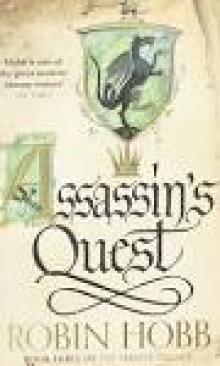 Assassin's Quest (UK)
Assassin's Quest (UK) Royal Assassin (UK)
Royal Assassin (UK) FF3 Assassin’s Fate
FF3 Assassin’s Fate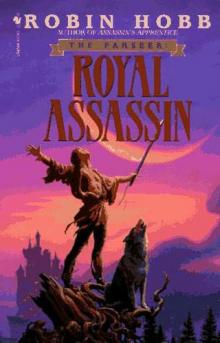 Royal Assassin tft-2
Royal Assassin tft-2 Fool’s Assassin: Book One of the Fitz and the Fool Trilogy
Fool’s Assassin: Book One of the Fitz and the Fool Trilogy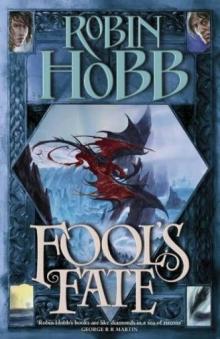 Fool's Fate ttm-3
Fool's Fate ttm-3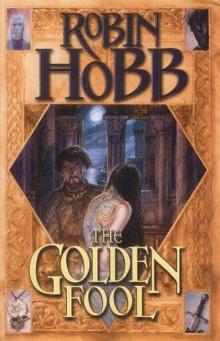 The Golden Fool ttm-2
The Golden Fool ttm-2 The Liveship Traders Series
The Liveship Traders Series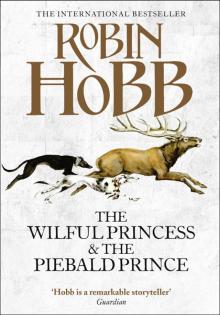 The Wilful Princess and the Piebald Prince
The Wilful Princess and the Piebald Prince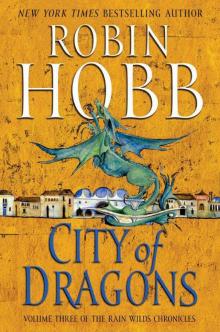 City of Dragons rwc-3
City of Dragons rwc-3 The Tawny Man 1 - Fool's Errand
The Tawny Man 1 - Fool's Errand Words Like Coins
Words Like Coins The Complete Tawny Man Trilogy Omnibus
The Complete Tawny Man Trilogy Omnibus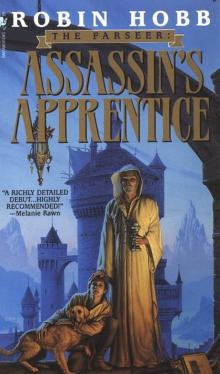 Farseer 1 - Assassin's Apprentice
Farseer 1 - Assassin's Apprentice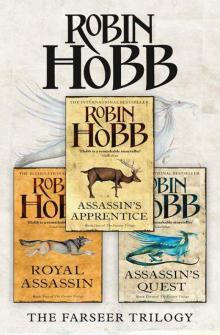 The Complete Farseer Trilogy Omnibus
The Complete Farseer Trilogy Omnibus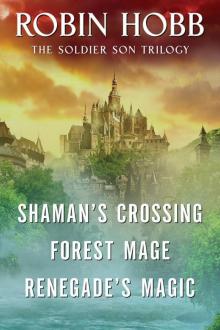 The Soldier Son Trilogy Bundle
The Soldier Son Trilogy Bundle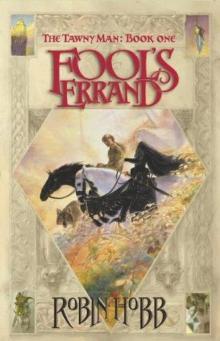 Fool's Errand ttm-1
Fool's Errand ttm-1 Blue Boots
Blue Boots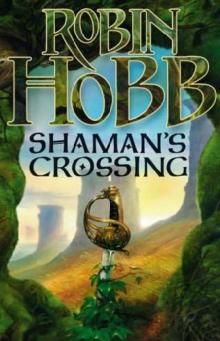 Shaman's Crossing ss-1
Shaman's Crossing ss-1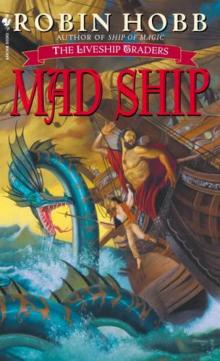 Mad Ship
Mad Ship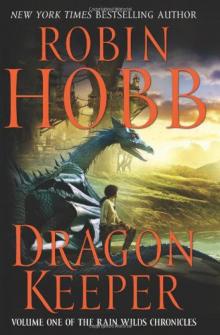 Dragon Keeper
Dragon Keeper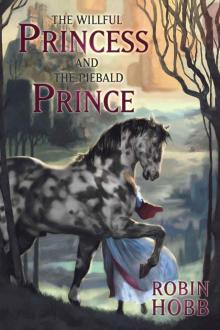 The Willful Princess and the Piebald Prince
The Willful Princess and the Piebald Prince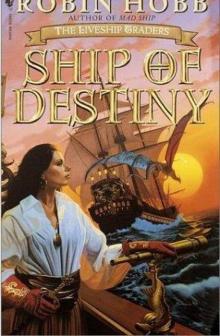 Ship of Destiny tlt-3
Ship of Destiny tlt-3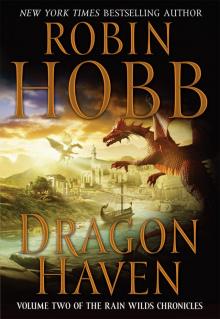 Rain Wild Chronicles 02 - Dragon Haven
Rain Wild Chronicles 02 - Dragon Haven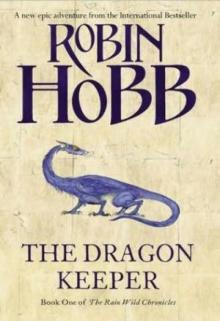 The Dragon Keeper trwc-1
The Dragon Keeper trwc-1 The Triumph
The Triumph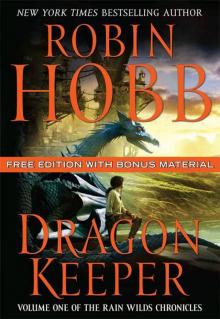 Dragon Keeper Free Edition with Bonus Material
Dragon Keeper Free Edition with Bonus Material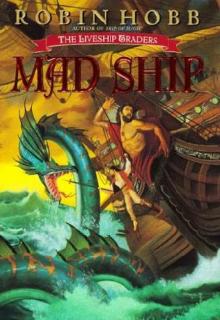 Mad Ship tlt-2
Mad Ship tlt-2 The Inheritance and Other Stories
The Inheritance and Other Stories Tawny Man 02 - Golden Fool
Tawny Man 02 - Golden Fool Farseer 2 - Royal Assassin
Farseer 2 - Royal Assassin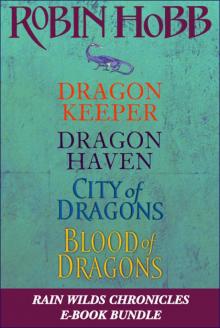 Rain Wilds Chronicles
Rain Wilds Chronicles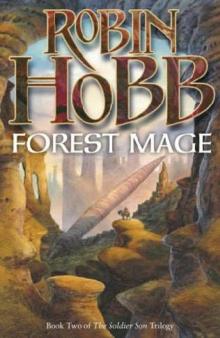 Forest Mage ss-2
Forest Mage ss-2 Ship of Magic lt-1
Ship of Magic lt-1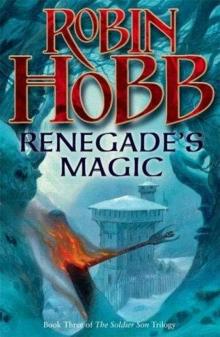 Renegade's Magic ss-3
Renegade's Magic ss-3